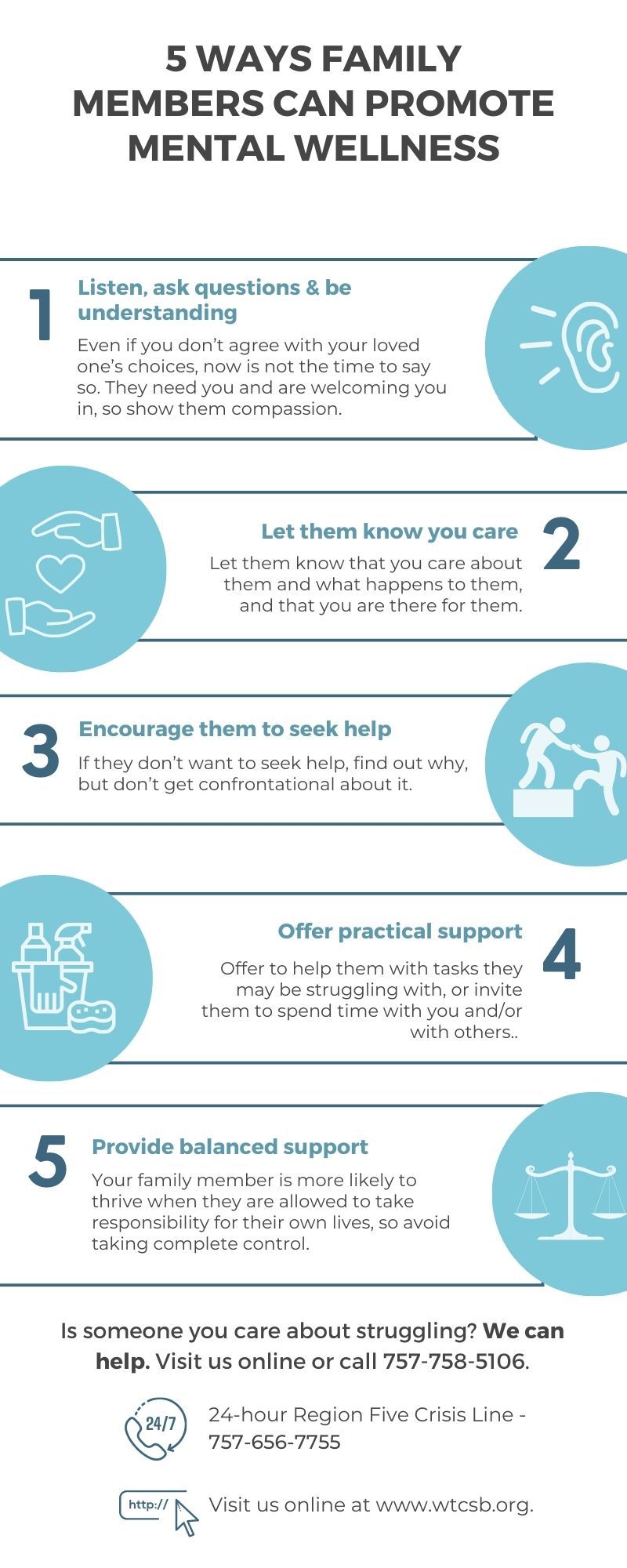When someone you care about has a mental health condition, it’s common to experience a myriad of feelings. You might feel scared or worried, or you might not understand. No matter how you feel, you can still give your loved one the support they need. If your child, sibling, spouse or other family member is struggling with depression, low mood, anxiety, or a serious mental health condition like bipolar disorder, obsessive-compulsive disorder (OCD), schizophrenia or major depressive disorder, you can help them by listening, taking a little time to educate yourself, and giving them whatever supports they may need.
What is Mental Wellness? Mental Wellness vs. Mental Health
We’ve all heard of mental health and how important it is, but have you heard of mental wellness? Mental health deals with behaviors or disruptions that affect the brain or mind. This could be due to unprocessed trauma, grief, or other issues happening in the person’s life, or it could simply be due to a naturally occurring imbalance of the chemicals in the brain.
Mental wellness, or mental wellbeing, is a lifelong, renewable and positive resource that we have that helps us to live a life characterized by good mental health.
Mental wellness includes four categories:
- Mental well being
- Emotional well being
- Social well being
- Psychological well being
When we experience mental wellness, we feel good, resilient and functional, and feel that we have positive relationships and contribute to society. Mental health is only one part of mental wellness, and mental wellness is critical for good mental health.
How Do You Know if Your Family Member Needs Mental Wellness Support?
If you think your family member might be struggling, don’t be afraid to ask! Even if you think it’s something more serious, you can help just by being there for them. It’s a myth that we can’t help someone who’s dealing with a serious mental health condition or who is suicidal.
If you think your family member might be thinking about suicide or going through another mental health crisis, get them in touch with the Region Five Crisis Line as soon as possible at 757-656-7755.
If your family member reaches out to you for help, or if you suspect they may be struggling with their mental wellness, you can start by talking to them to find out more about what’s going on.
Related: 7 Signs of Depression
How to Promote the Mental Wellness of a Family Member With a Serious Mental Illness
Research has shown that one of the most important aspects of treatment of mental illness is family support. There’s plenty of evidence that shows that when a person knows they can count on a family member for support during a mental illness episode, not only are they more likely to seek help, but they believe the help is worth it, and treatment is much more effective. This is why supporting our family members in their mental wellness is so important.
Not sure where to begin when talking to your family member about their mental wellness? Here are 5 ways to get the conversation started and discover how you can best support them.
1. Listen, Ask Questions, and Be Understanding
Talking to your family member about their mental wellness and mental health can be an opportunity to provide information, support and guidance. And learning about your family member’s mental health issues can equip you to help them better now and in the future, which can lead to:
- Improved recognition of early signs of mental health problems
- Earlier treatment
- Greater understanding and compassion
When you’re talking to your family member about their concerns, be sure to listen attentively, ask any questions you may have, and avoid being judgmental. Even if you don’t agree with your loved one’s choices, now is not the time to say so. They need you and are welcoming you in, so show them compassion.
2. Let Them Know You Care
During the conversation, be sure to express your concern and support. Let them know that you care about them and what happens to them, and that you are there for them.
3. Encourage Them to Seek Help
Find out if your family member has seeked professional help, and, if not, encourage them to do so. If they don’t want to seek help, find out why, but don’t get confrontational about it. Ask questions about how they feel and why they feel that way. Maybe they don’t trust therapists or don’t want to take medications that make them feel bad, emotionally or physically. Once you really understand where they’re coming from, you’re in a position to help, and perhaps one day they will be ready to take the next step.
4. Offer Practical Support
Besides being there for them emotionally, offer to help them with everyday tasks they may be struggling with, or, if they’re lonely, invite them to spend time with you or with your family or friends group.
5. Provide Balanced Support – Take a Step Back When You Need To
When a family member is struggling with their mental wellness, it’s easy to want to take charge. Of course, you only want to help, but taking on complete responsibility isn’t healthy for either of you.
You can still offer support! The APA (American Psychological Association) notes that individuals living with mental illness are more likely to thrive when they are allowed to take responsibility for their own lives. Instead of completely taking control of the situation, you can better help your loved one by offering an appropriate level of support. The APA gives the following example:
“Instead of driving your loved one to every appointment or errand, for instance, help him or her get a bus pass and learn the routes. Rather than preparing every meal for your loved one, teach him or her how to cook some simple, healthy meals.”
Don’t Forget to Support Your Own Mental Wellness!
When someone we love is hurting, we sometimes forget about our own health and happiness. If your child, spouse or other loved one is struggling, it’s understandable to want to do everything you can to support them, but just don’t neglect your own mental wellness.
Rex Dickens of the NAMI Sibling and Adult Children Network says in his list of tips and reminders for people with loved ones with mental illness that “it is not OK for you to be neglected. You have needs & wants too.”
Dickens, who wrote the book “How to Cope with Mental Illness in Your Family” and several other pieces on handling mental illness in the family, goes on to say, “You are not a paid professional caseworker. Work with them about your concerns. Maintain your role as the sibling, child, or parent of the individual.”
Mental Wellness is a Lifelong Journey
Mental wellness isn’t something you can just attend to when things get bad. It’s something you have to maintain, especially if you have a mental health condition. If someone you care about is living with a serious mental illness, talk to them about mental wellness, and remind them that help is available.
Western Tidewater Community Service Board has been proudly serving Franklin, Suffolk, and the counties of Isle of Wight and Southampton since 1971. We’re your local single point-of-entry for behavioral health services. If you or a family member needs support, we are here for you. We provide an array of services, including individual, group and family therapy, as well as supports and resources for those living with mental illness.
Make an appointment for same-day access online today or call us at 757-758-5106.
Are you experiencing a crisis? Need to talk to someone right away? Call the Region Five crisis line at 757-656-7755.
Share the infographic! Copy the embed code.
<a href=”https://www.wtcsb.org/5-ways-family-members-can-promote-mental-wellness/”>
<img src=”https://www.wtcsb.org/wp-content/uploads/2023/01/5-Ways-Family-Members-Can-Promote-Mental-Wellness.jpg” /></a







